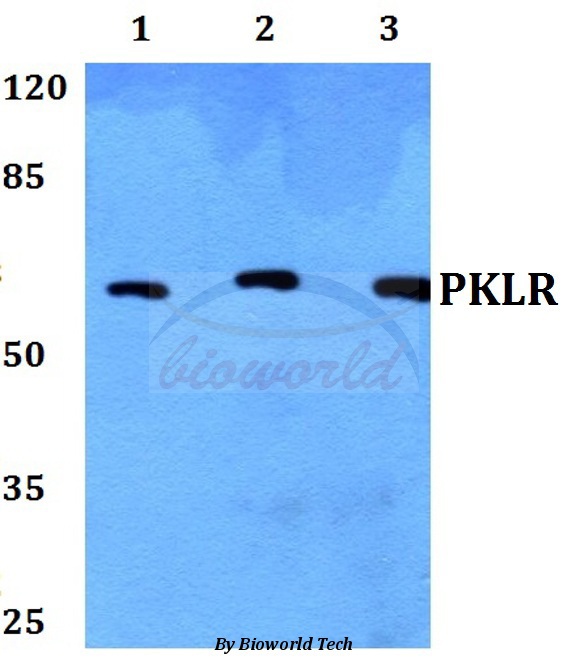Product Name :
PKLR polyclonal antibody Background :
In mammals, four different isoenzymes exist for pyruvate kinase. Based on their tissue distribution, the isoenzymes are designated L-type (for predominant expression in the liver), R-type (for predominant expression in red blood cells), M1-type (for predominant expression in muscle, brain and heart) and M2-type (for predominant expression in fetal tissues). Pyruvate kinases are responsible for catalyzing the final step in glycolysis: the conversion of phosphoenolpyruvate to pyruvate with the coinciding generation of ATP. The PKLR (pyruvate kinase, liver and RBC) gene encodes the L- and R-type isoenzymes through alternative splicing events under the control of different promoters. The R-type isoform, also known as RPK (R-type pyruvate kinase), exists as a tetramer and, when functioning improperly, can result in chronic/hereditary nonspherocytic hemolytic anemia (CNSHA/HNSHA) or pyruvate kinase hyperactivity (also called high red cell ATP syndrome). The L-type isoform, alternatively known as PKL (pyruvate kinase L-type), also exists as a tetramer and is upregulated by glucose with implications in maturity-onset diabetes of the young (MODY). Product :
Rabbit IgG, 1mg/ml in PBS with 0.02% sodium azide, 50% glycerol, pH7.2 Storage&Stability :
Store at 4°C short term. Aliquot and store at -20°C long term. Avoid freeze-thaw cycles. Specificity :
PKLR polyclonal antibody detects endogenous levels of PKLR protein. Immunogen :
A synthetic peptide corresponding to residues in Human PKLR. Conjugate :
Unconjugated Modification :
Unmodification
PKLR polyclonal antibody Background :
In mammals, four different isoenzymes exist for pyruvate kinase. Based on their tissue distribution, the isoenzymes are designated L-type (for predominant expression in the liver), R-type (for predominant expression in red blood cells), M1-type (for predominant expression in muscle, brain and heart) and M2-type (for predominant expression in fetal tissues). Pyruvate kinases are responsible for catalyzing the final step in glycolysis: the conversion of phosphoenolpyruvate to pyruvate with the coinciding generation of ATP. The PKLR (pyruvate kinase, liver and RBC) gene encodes the L- and R-type isoenzymes through alternative splicing events under the control of different promoters. The R-type isoform, also known as RPK (R-type pyruvate kinase), exists as a tetramer and, when functioning improperly, can result in chronic/hereditary nonspherocytic hemolytic anemia (CNSHA/HNSHA) or pyruvate kinase hyperactivity (also called high red cell ATP syndrome). The L-type isoform, alternatively known as PKL (pyruvate kinase L-type), also exists as a tetramer and is upregulated by glucose with implications in maturity-onset diabetes of the young (MODY). Product :
Rabbit IgG, 1mg/ml in PBS with 0.02% sodium azide, 50% glycerol, pH7.2 Storage&Stability :
Store at 4°C short term. Aliquot and store at -20°C long term. Avoid freeze-thaw cycles. Specificity :
PKLR polyclonal antibody detects endogenous levels of PKLR protein. Immunogen :
A synthetic peptide corresponding to residues in Human PKLR. Conjugate :
Unconjugated Modification :
Unmodification
-
 Western blot (WB) analysis of PKLR polyclonal antibody at 1:500 dilution Lane1:Hela whole cell lysate Lane2:Raw264.7 whole cell lysate Lane3:PC12 whole cell lysate
Western blot (WB) analysis of PKLR polyclonal antibody at 1:500 dilution Lane1:Hela whole cell lysate Lane2:Raw264.7 whole cell lysate Lane3:PC12 whole cell lysate
Bioworld Biotech only provide peptides for our antibodies and do not provide additional peptide customization services.
Price/Size :
USD 368/1mg/vial
Tips:
For phospho antibody, we provide phospho peptide(0.5mg) and non-phospho peptide(0.5mg).Describe :
Blocking peptides are peptides that bind specifically to the target antibody and block antibody binding. These peptide usually contains the epitope recognized by the antibody. Antibodies bound to the blocking peptide no longer bind to the epitope on the target protein. This mechanism is useful when non-specific binding is an issue, for example, in Western blotting (WB) and Immunohistochemistry (IHC). By comparing the staining from the blocked antibody versus the antibody alone, one can see which staining is specific; Specific binding will be absent from the western blot or IHC performed with the neutralized antibody.Formula:
Synthetic peptide was lyophilized with 100% acetonitrile and is supplied as a powder. Reconstitute with 0.1 ml DI water for a final concentration of 10 mg/ml.The purity is >90%,tested by HPLC and MS.
Storage:
The freeze-dried powder is more stable. For short time at 2-8°C. For long term storage store at -20°C.
Note :
This product is for research use only (RUO only). Not for use in diagnostic or therapeutic procedures.
 PKLR polyclonal antibody
PKLR polyclonal antibody  Datasheet
Datasheet COA
COA MSDS
MSDS SHIP
SHIP